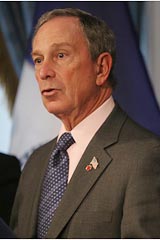Billionaire Michael Bloomberg won a third term as New York mayor Tuesday in a closer-than-expected race against a Democratic challenger who stoked voter resentment over the way Bloomberg changed term-limits law so he could stay in office, AP reported.
With 99 percent of precincts reporting, Bloomberg, the richest man in New York and founder of the financial information company Bloomberg LP, defeated William Thompson Jr. 51 percent to 46 percent.
In the days leading up to the election, polls showed Bloomberg with as much as an 18-point lead, an edge so big that critics accused the mayor of overkill in his strategy of bombarding the city with campaign ads.
His margin of victory was far smaller than the nearly 20-point blowout he pulled off in 2005.
When all the bills are paid, Bloomberg will probably have spent more than $100 million on his campaign, the most expensive self-financed campaign in U.S. history. Thompson, the city's comptroller, relied on donations and matching funds for his mayoral bid, and was on track to have spent about a tenth of Bloomberg's staggering total.
Thompson ran up huge margins in black and Hispanic neighborhoods, winning by a 3-to-1 margin in some districts.
He beat Bloomberg handily in predominantly black neighborhoods like Bedford-Stuyvesant in Brooklyn and Jamaica in Queens. He won Harlem and East Harlem easily, along with other heavily Hispanic districts in upper Manhattan and the Bronx.
By contrast, Bloomberg won easily on Staten Island, which has a much larger white population. He also fared better in Manhattan, particularly on the Upper East Side, where he lives.
The tiny margin could weaken his power and make his third term more difficult at City Hall, where Democrats poised to sweep into citywide offices indicated they would not shy away from disagreeing with the mayor.
"You'll see a lot of strong voices as checks and balances," said Democrat Bill de Blasio, who won the job of City Hall ombudsman Tuesday. "It will be a very different experience than what he experienced the last eight years."
Bloomberg is just the fourth mayor to win a third term, after Fiorello La Guardia, Robert Wagner and Ed Koch.
Bloomberg was a Republican but left the party in 2007 to explore a presidential bid, a dream he eventually abandoned. For his third mayoral run, he ran again on the GOP and Independence Party lines.
While Bloomberg was often described as having every advantage in the race, including his estimated $17.5 billion fortune and consistently high approval ratings, his campaign did have to overcome some obstacles.
The mayor, who has close ties to Wall Street and development, was running for re-election at a time when finance and real estate were falling apart and those relationships were not necessarily seen as positives.
There are also the numbers - New York City leans heavily to the left, with Democrats outnumbering Republicans by a ratio of 5-to-1. Democrats were also energized by their party's White House win in 2008.
And New Yorkers were angry that Bloomberg reversed his long-held support for term limits last year and persuaded the City Council, in a matter of weeks, to extend the law so he could run for a third term.
Thompson sought to stoke that resentment, but it was not enough. He did not make a strong, separate case for why he should be elected.
Many Thompson supporters said Tuesday that term limits was the single reason why they voted for him.
Jason Gerald supported Bloomberg in 2005 but voted for the Democrat this year.
"I didn't like the way he overturned term limits," said Gerald, a retired police officer. "He thinks he's the only person who can lead this city."
When Bloomberg announced last year his intention to change the law and run again, he said it was because the city needed his financial expertise to get through the economic meltdown.
He never revived that argument during the race, though, which grew increasingly negative as Election Day drew near and polls showed most voters still did not know much about Thompson.
The Bloomberg campaign saw its opportunity - it defined Thompson through negative ads and attacks before the Democrat could do it himself.
He will likely have spent more than $50 million on advertising alone, and millions more on his huge army of staffers, some of them the top strategists and consultants plucked from presidential-level campaigns.
The mayor was able to target each voter with unique messages using a database managed by Ken Strasma, who was President Barack Obama's national targeting director in 2008.
The data was crucial not only in shaping the campaign's messages, but also for Election Day operations as the campaign tracked voter turnout in every election district.
For example, campaign officials noticed lower turnout in some areas of the Bronx and Queens than the data had predicted, so the campaign changed its operations on the ground.
Field workers were rerouted to different areas in Queens to knock on doors and get voters to the polls, and former Mayor Ed Koch was summoned to record a last-minute robocall that began calling Bronx voters around 5 p.m.






